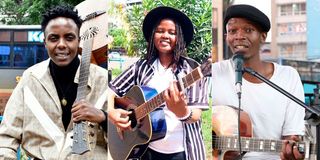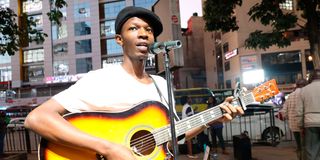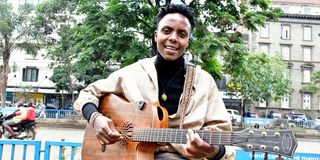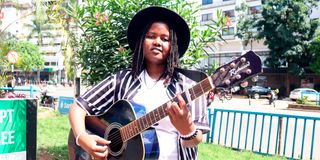
Nairobi streets musicians (from left) Edward Ndungu Njoroge, Muringo Matu and Peter Wambua Ndirangu.
Ever caught those fire street performances that make you forget you're in the middle of CBD's madness?
That's exactly what happened when I stumbled on D'rango's vibe outside Kimathi House.
Peter Wambua, better known as D'rango, stood with his guitar, his rendition of Take That's "Back for Good" floating above the urban cacophony. His masterful fingerwork and compelling voice had turned this busy corner into an impromptu concert hall, drawing passersby into a moment of shared appreciation.
D'rango represents a growing movement of young musicians who have chosen Nairobi's streets as their stage. These performers are redefining our city's cultural landscape, turning unexpected corners into venues where art and commerce meet. While some may see them simply as street performers, they are, in fact, entrepreneurs of entertainment, building their careers one song at a time.
Among these emerging artists are Edward Ndung'u and Muringo Matu, whose stories reveal why more young musicians are embracing street performance. Their tales offer insight into how Nairobi's sidewalks are becoming platforms for artistic expression and economic opportunity. They share with MyNetwork why they are singing on the streets.
The streets have taught me resilience and humility
Peter Wambua aka D’rango, 32
“If you’ve ever walked the streets of Nairobi, you may have seen me—just another musician with a guitar, pouring my heart out on the busy pavements of the city. For the past two years, the streets have been my stage, offering me a ready audience. And though it isn’t glamorous, it feels real.
Every coin tossed into my case is not just money—it is a sign that someone out there is listening to my voice. They feel what I’m trying to say, and that is everything to me.
I was born and raised in Nakuru town, a place where dreams could feel as distant as the stars. But even as a child, I had big dreams, ones that refused to be limited by my surroundings. My love for music started early and it became my escape, my joy, and my way of expressing what I couldn’t always put into words. I’d spend hours listening to the radio, mimicking the songs, and imagining myself on a stage, performing for an audience that was moved by my music.
By the time I finished high school in 2011, I knew Nakuru couldn’t contain me. Nairobi was calling. It was the city where dreams either flourished or withered, and I was determined to find out which it would be for me. When I arrived in Nairobi, the city didn’t exactly roll out a red carpet. Instead, it greeted me with its harsh reality. Jobs were scarce, and the cost of living was high, but I had one thing—I had music.
I joined a group of street performers, and together we made the city our stage. Those were tough days, but they were also filled with lessons. I learned how to connect with people, and how to tell stories through my songs that would stop someone in their tracks, even for just a moment. Street singing isn’t glamorous.
In fact, it is one of the hardest things I’ve ever done. Waking up early, finding a spot in a busy area, and hoping that the crowds would stop long enough to listen. But most people don’t. They are in a hurry to go back home with their faces buried in their problems. Some scoff, others outrightly ignore me, and there are days when I don’t make enough money for a meal. Then there are the authorities.
The Kanjo’s can really frustrate you. They think I make so much money and they demand bribes. This is a big challenge. But the hardest part of street singing is the vulnerability. You’re putting yourself out there, pouring your heart into every note, knowing full well that most people won’t even notice.

Peter Wambua Ndirangu sings on Kenyatta Avenue in Nairobi on February 18, 2025.
There are days I question everything. Was this all my life is meant to be? Am I fooling myself thinking I would make something out of this? That aside, my music speaks of love, hope, resilience, and the beauty of everyday life. It’s not just about entertainment; it’s about connection. I’ve had the privilege of performing at events and even touring internationally, something I never could have imagined as a young boy.
But I’ll never forget the streets of Nairobi. They have taught me resilience and humility. They showed me the power of persistence and the importance of believing in yourself, even when the odds are stacked against you.
To anyone out there chasing a dream, my story is simple: Don’t give up. Your journey might not look like mine, but every step you take matters. The world is full of people who are waiting to hear your story, your song—whatever it is you have to offer. So keep going, because you never know who might stop to listen.”
My goal this year is to explore performing in matatus
Edward Ndung'u, aka Tajezo, 26
“Most people know me as TAJEZO. I am a singer-songwriter, guitarist, pianist, and an upcoming producer. Music is my passion, my career, and, honestly, my everything. It has been my lifeline through thick and thin over the last five years. Busking has been a cornerstone of my journey. You’ll often find me in Nairobi CBD, sometimes near The University of Nairobi Avenue, GPO, or Uhuru Park.
Busking has opened doors I never imagined. I’ve met people from the Netherlands and South Africa, some of whom have invited me to perform at events in Nairobi. My love for music wasn’t always apparent. As a child, I was more interested in football and the carefree activities of childhood. Then, around 2011, just before high school, I fell ill and was diagnosed with epilepsy. The stigma and misconceptions surrounding the condition left me depressed. I needed refuge, and that’s when I discovered music. It became my therapy, my escape, and eventually, my calling.
When I finished high school, I knew I wanted to pursue music seriously. Mordecai Mwini Kimeu from Hart the Band was my role model back then. I had his photos on my locker, desk, and dorm wall. Coincidentally, my mom worked near a place where people often gathered with guitars to sing. She encouraged me to audition there, and that’s how I got into music.

Edward Ndungu, also known as Tajezo, sings during the interview on the streets of Nairobi on January 30, 2025.
My music career officially started in 2017 when I joined the Sauti Academy in Nairobi. At the time, the school was ideal for upcoming musicians, with alumni like H_art the Band, Bensoul and Elani. I remember auditioning and being one of the lucky few selected to join the school. That was the beginning of a bittersweet journey filled with triumphs and challenges.
Although the academy no longer exists, the lessons I learned there continue to guide me. Music became part of my daily routine. Every morning, I practice. In the afternoons, I meet with friends to jam and write songs. Over the years, I’ve written close to 500 songs and hope to release at least a quarter of them by the end of this year. I’ve had the privilege of working with incredible people and organisations, like Jay Blessing, PAWA 254 (under Boniface Mwangi), Vice Versa Global from the Netherlands, and Defenders Coalition.
In 2024, I was thrilled to be selected as one of the top five in Kenya to represent the country at the Bongo Star Search. Although I didn’t make it to the top 20, I’m proud of how I represented Kenya.
Singing on the streets of Nairobi comes with its challenges. Some business owners don’t appreciate performers outside their premises, and city council officers often demand bribes or accuse us of causing disruptions.
But the streets have also been my greatest teacher. It has taught me resilience, how to connect with diverse audiences, and the value of persistence. One of my goals this year is to explore performing in matatus. It’s a creative way to reach an audience that’s already gathered, but the logistics are daunting.
Imagine balancing a guitar while the vehicle sways through Nairobi’s chaotic traffic! Still, I’m excited to try. Music is more than just a career for me; it’s a lifestyle. It’s how I connect with people and tell real stories. It’s a vibration that heals and unites us.
Though I’m not yet making the kind of money I’d hoped for, I’ve learned that fulfilment doesn’t always come from financial success. It’s about doing what you love and knowing that everything else will eventually align. The streets of Nairobi have become my stage, my classroom, and my proving ground. Each day I sing, I take one more step toward building my brand and reaching the top. As we used to say at Sauti Academy: “Respect the process, maintain the discipline.” That’s exactly what I’m doing.”
Every day I step onto the streets with my guitar, I feel alive.
Muringo Matu, aka Payne 2.1.7, 23
“Most people know me as Payne 2.1.7. My journey might not make sense to everyone, but every step I’ve taken has led me to where I am now—singing on the streets of Nairobi.
I graduated from Nairobi Technical Training Institute in Thika last year with a diploma in project management. I’m currently pursuing a higher diploma in the same field, having completed my coursework, and I’m set to graduate at the end of the year. I chose project management because it’s versatile—it can take you anywhere, from corporate boardrooms to creative spaces. But to be honest, my heart has always been in music.
Growing up, I was always surrounded by music. I don’t remember a time when it wasn’t a part of my life. In church, at school, or at home, I felt most alive when there was a rhythm to move to or a melody to sing along with. But like most young people, I faced pressure to choose a “serious” career.
My first dream was to become an aeronautical engineer. I was fascinated by planes and the idea of building something that could defy gravity. When that dream faded, I thought mass communication might be my path, but my mom didn’t think it was a good idea. By the time I left high school in 2018, music was calling to me louder than ever. I tried to push it aside, thinking I could balance it as a hobby while pursuing a “real job.” But it didn’t take long to realise that music wasn’t just a hobby—it was a part of who I am.
Music saved me in many ways. It became my escape, my therapy, and my voice when I couldn’t find the words to express myself. I began immersing myself in it—singing, learning to play instruments like the guitar and piano, and even diving into music production.
Writing songs came naturally to me. It’s how I process my emotions and make sense of the world. Over the years, I’ve written hundreds of songs. Some I’ve kept for myself; others I’ve sold to artists who needed them.

Muringo Matu plays her guitar on Kenyatta Avenue in Nairobi on December 27, 2024.
In October 2024, I released my first EP, Pages. That project was my heart poured into five tracks: “Viva Woman,” an anthem for women’s empowerment; “Keep On Trying,” a song about mental health and resilience; “True,” a celebration of pure, unconditional love; “Niambie,” a spiritual reflection on faith and connection; and “Pewa,” a soulful, feel-good track that invites listeners to just breathe and enjoy the moment.
Each song is a piece of me—my thoughts, my experiences, and my dreams. So how did I end up singing on the streets of Nairobi? It started as an experiment late in 2023. I wanted to share my music with people who might not have the chance to hear it otherwise. The streets are alive with stories, struggles, and triumphs. People pass each other every day without really connecting.
I thought, what if my music could create a moment of connection? What if I could make someone smile, even for just a second? That first day was nerve-wracking. I wasn’t sure how people would react. Would they stop to listen? Would they ignore me? But once I started singing, something incredible happened. People paused. They smiled. Some nodded along to the rhythm, while others dropped a coin or two into my guitar case.
It was more than I expected. I kept going back, and with time, I met other street performers who shared my passion. Sam Kule was one of the first to believe in me. He gave me my first chance to perform in Nairobi’s CBD, and his encouragement meant the world. This year, I teamed up with an amazing group of artists, including D’rango and a few others.
Together, we create music in the heart of the city whenever we’re not booked for gigs. Street music has taught me so much about humanity. It’s raw, unfiltered, and deeply personal. I’ve learned that music has the power to break down walls. It can bring people together, no matter their background or struggles. I’ve seen busy professionals slow down to listen, street kids dance like nobody’s watching, and tired souls find a spark of joy. For me, singing on the streets is about more than just the music. It’s about living in the moment and reminding people that they’re not alone.
Life in Nairobi can be tough, and everyone has their battles. If my voice can provide a little hope or comfort, then I know I’m doing something right. Music is my way of giving back to the world. It’s my way of showing love, spreading kindness, and connecting with others.
Even when words fail me, music speaks. It’s the language of my soul, and I hope it resonates with everyone who hears it. Every day I step onto the streets with my guitar, I feel alive. The city’s rhythm matches my own, and together, we create something beautiful. I don’t know what the future holds, but as long as I have my voice, I’ll keep singing.”
Street singing is an alternative to idling, crime and drugs.
Adrian Mosh, 23, Music producer

Adrian Omondi, a street singer, performs while playing his guitar along Kenyatta Avenue in Nairobi on February 19, 2025.
“When it comes to street singing, I have nothing but admiration for it. Honestly, it’s something I adore. Think about it—the courage, the spirit, and the sheer determination it takes to put yourself out there like that. Not everyone can do it. It takes real guts and talent to stand in the middle of the city and captivate an audience, even if just for a moment. For me, street singing isn’t just an art; it’s also a form of marketing and activation. Music is both an art and a product, and street performances are a creative way of getting it to the people. It’s raw and authentic, which makes it stand out. Now, do I think young, upcoming artists can make it in the music industry through street singing? That’s a tricky question. The music industry—and the art world in general—has always been unpredictable.
There’s no guaranteed path to success. Sure, some street singers might break into the mainstream, but even if they don’t, it’s still a legitimate way to earn a living. Those donations they receive? That’s income, and for many musicians, being able to sustain themselves through their craft is a dream come true.
It’s better than idling. We all know the risks of having too much free time, especially for young people. It can lead to substance abuse or even crime. At least with street singing, they’re creating something beautiful and meaningful while making an honest living.
That said, street singing is just one of many trends in the industry right now. Trends come and go in every field, and music is no exception. TikTok promotions, for example, have been a major strategy for a while now, and they’re still hugely popular.
There’s this big artist from Europe, who’s also an internet personality. She’s taken street performances to another level. She streams her performances live on social media, which means she earns both on the streets and online platforms. And she’s killing it. The interesting thing is that she focuses more on covers than original songs, which is a smart way to attract attention and build a following.
It’s a valid form of expression and income. As a producer and someone who’s deeply invested in art, I respect the hustle and creativity it takes to make street singing work.”






